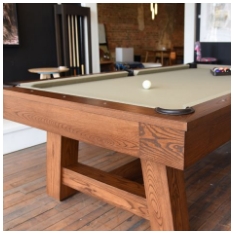Billiards, commonly referred to as pool, has long been celebrated as one of the most engaging and enjoyable indoor games. Whether played casually with friends or competitively in a league, the game of billiards offers a range of benefits and experiences that make it a favorite pastime. In this article, we’ll explore why billiards is considered the best, focusing on the appeal and significance of pool tables in this classic game.

The Timeless Appeal of Billiards
Billiards has been a popular game for centuries, and its appeal endures due to several key factors. From its strategic depth to its social aspects, billiards offers something for everyone.
Strategic Depth and Skill Development
One of the primary reasons billiards is so highly regarded is its strategic depth. Unlike many games that rely solely on chance, billiards requires a combination of skill, precision, and strategy. Players must master techniques such as positioning, shot selection, and cue control to excel. This complexity not only makes the game intellectually stimulating but also provides a rewarding experience as players improve their abilities.
Billiards is also celebrated for its social aspect. Pool tables are commonly found in social settings such as bars, clubs, and recreational centers, making them a focal point for social gatherings. Playing billiards offers an opportunity for players to interact, compete, and enjoy each other’s company in a relaxed environment.
The game’s versatility in accommodating various skill levels further enhances its social appeal. Beginners can enjoy casual play, while experienced players can engage in more competitive matches. This inclusivity ensures that billiards can be enjoyed by people of all ages and skill levels, making it a popular choice for social entertainment.
The Essential Role of Pool Tables
Pool tables are the centerpiece of any billiards game, and their design and quality significantly impact the playing experience. Several factors make pool tables essential to the game’s appeal.
Craftsmanship and Quality
The craftsmanship and quality of pool tables play a crucial role in determining the overall playing experience. High-quality pool tables are constructed with precision, using materials such as solid wood and high-grade slate. The level of craftsmanship affects factors like the table’s durability, stability, and playing surface.
A well-made pool table provides a consistent playing surface, ensuring that the game is fair and enjoyable. The precision required for accurate shots and positioning highlights the importance of a high-quality table in achieving optimal gameplay.
Aesthetic Appeal and Home Design
Pool tables also contribute to the aesthetic appeal of a space. Their classic design and elegant finish can enhance the look of a game room, living area, or recreational space. Many pool tables come in a variety of styles and finishes, allowing them to complement different home decor themes.
In addition to their visual appeal, pool tables can serve as a statement piece in a room. Their presence often signifies a dedication to quality entertainment and provides a focal point for social gatherings. This aesthetic value adds to the overall enjoyment of the game.
Versatility and Adaptability
Pool tables are versatile and can be adapted to different types of billiards games. Whether it’s eight-ball, nine-ball, or snooker, a standard pool table can accommodate various game formats. This adaptability ensures that players can enjoy a range of billiards games without needing multiple tables.
The ability to switch between different game types also adds to the appeal of pool tables. Players can explore different challenges and variations within the same setup, keeping the experience engaging and diverse.
The Cultural and Historical Significance of Billiards
Billiards has a rich cultural and historical background that contributes to its enduring popularity. Understanding this context adds depth to the appreciation of the game and its significance.
Historical Roots
The game of billiards dates back several centuries, with origins that can be traced to 15th-century Europe. Over time, billiards has evolved, incorporating various rules and styles. This long history adds a sense of tradition and legacy to the game, making it more than just a pastime.
The historical development of billiards also reflects its adaptability and resilience. As the game spread across different cultures and regions, it adapted to local preferences and practices, enriching its global appeal.
Cultural Impact
Billiards has had a significant cultural impact, influencing various aspects of society, including art, film, and literature. Iconic movies and works of literature often feature billiards scenes, highlighting the game’s role in popular culture.
The game’s portrayal in media contributes to its mystique and allure. Billiards is often associated with sophistication and skill, further enhancing its reputation as a premier indoor game.
Conclusion
Billiards, with its combination of strategic depth, social interaction, and the essential role of high-quality pool tables, stands out as a premier indoor game. Its timeless appeal, craftsmanship, and cultural significance make it a favorite pastime for many. Whether you’re a seasoned player or new to the game, billiards offers a unique blend of challenge and enjoyment that continues to captivate enthusiasts around the world. Embracing the game of billiards not only provides entertainment but also connects players to a rich tradition of skill and camaraderie.





